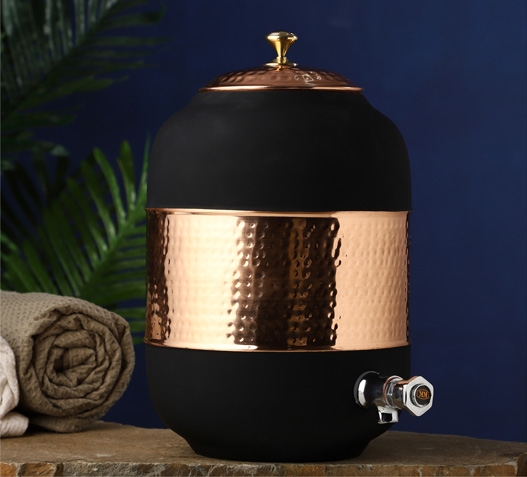Discovering the Diverse Applications of Copper Products in Modern Industries
Copper products have actually developed themselves as vital parts throughout a myriad of modern sectors, mostly because of their amazing conductivity, malleability, and resistance to rust. From enhancing the efficiency of electric systems to playing a critical function in sustainable power technologies, the versatility of copper is apparent. Furthermore, its recyclability settings it as a lasting selection in manufacturing and electronics. As industries increasingly focus on technology and sustainability, the diverse applications of copper warrant a closer evaluation, especially regarding their possible effect on future environmental methods and technological developments.
Electrical Applications of Copper
Copper is a necessary material in the electric sector, representing about 60% of the total need for non-ferrous metals globally - Copper Products. Its remarkable electrical conductivity, which is almost two times that of light weight aluminum, makes it the favored choice for a vast array of electrical applications. From electrical wiring systems in industrial and property buildings to high-voltage power transmission lines, copper ensures efficiency and dependability in electrical power delivery
In enhancement to wiring, copper is indispensable to the manufacturing of electric components such as transformers, electric motors, and generators. These components utilize copper's thermal conductivity and malleability, vital for warm dissipation and reliable efficiency. Copper's resistance to rust boosts the lifespan and sturdiness of electrical systems, making it a cost-effective service in the long term.
The growth of renewable resource sources, such as solar and wind power, has actually better raised the need for copper in electric applications. As industries shift in the direction of lasting power services, copper's role ends up being a lot more crucial. Overall, the flexibility and efficiency attributes of copper strengthen its standing as a foundation material within the electrical field, driving technology and performance across numerous applications.
Plumbing and Piping Solutions
In modern pipes systems, the selection of materials dramatically impacts both functionality and long life. Copper has actually become a recommended choice due to its one-of-a-kind homes, including rust resistance and antimicrobial qualities. These characteristics make certain that copper piping stays resilient and risk-free for carrying drinkable water, a critical consideration in domestic and business applications.
Among the vital advantages of copper in pipes is its capacity to hold up against heats and pressures, making it ideal for a range of applications, from warm water systems to home heating and cooling networks. Furthermore, copper's versatility enables much easier installation in complicated piping designs, minimizing the threat of failures and leaks.
An additional noteworthy advantage is copper's lengthy life-span, often exceeding half a century with correct maintenance. This longevity not just minimizes replacement costs however likewise contributes to lasting techniques by lowering waste. Copper's recyclability lines up with modern-day ecological criteria, advertising a round economy within the pipes market.
Copper in Renewable Power
The versatility of copper expands past plumbing applications, playing an essential duty in the renewable resource market. Its outstanding electrical and thermal conductivity makes it a vital material in the production and distribution of sustainable energy sources, especially solar and wind power. In photovoltaic panels, copper is used in photovoltaic cells and circuitry, promoting efficient power conversion and transmission. Its resistance to corrosion guarantees durable performance, which is essential for making best use of power output in time.

In addition, as the global need for electric vehicles (EVs) rises, copper's function in battery systems and billing framework becomes much more substantial. The material's capability to conduct power successfully is important to the efficiency of EV batteries, enhancing array and billing rate.
Copper's Role in Electronic devices
Electronics producing counts heavily on copper's remarkable buildings, particularly its high electrical conductivity and thermal efficiency. These features make copper an optimal option for a vast array of electronic parts, consisting of adapters, motherboard, and electrical wiring. The metal's ability to successfully transmit electrical signals makes certain very little energy loss, which is vital in high-performance electronic gadgets.
Additionally, copper's thermal conductivity plays a considerable role in warm dissipation, securing sensitive components from overheating. This is particularly essential in contemporary electronics, where portable designs lead to boosted heat generation. Copper is likewise favored for its pliability and ductility, allowing it to be conveniently shaped into elaborate designs that meet the demands of advanced electronic applications.
With the increase of customer electronic devices, telecoms, and electric cars, the demand for copper in the electronics sector continues to grow. Thus, copper remains a foundation product in the ever-expanding area of electronic devices.
Ingenious Makes Use Of in Production

One address noteworthy application is in additive read what he said manufacturing, where copper-based materials are utilized in 3D printing procedures. This permits the creation of lightweight elements and complicated geometries, especially in the aerospace and automobile sectors. Furthermore, copper's thermal conductivity makes it a perfect option for warmth exchangers, boosting efficiency in industrial cooling systems.
Moreover, the rise of clever production has actually seen the consolidation of copper in IoT gadgets, where its conductive capabilities support advanced sensing innovations. In the realm of eco-friendly power, copper is crucial in the production of photovoltaic panels and wind turbines, assisting in a lot more reliable power conversion and circulation.
As industries make every effort for sustainability and advancement, copper's flexibility and efficiency proceed to place it as a vital product, driving innovations in production and adding to the advancement of smarter, a lot more reliable products.
Conclusion
The indispensable duty of copper in sustainable energy and its vital function in electronics underscore its relevance in advancing sustainable methods. Jointly, these applications highlight copper's vital payment to technological development and commercial performance in modern culture.
From boosting the performance of electric systems to playing an essential function in eco-friendly power innovations, the flexibility of copper is apparent. As sectors progressively focus on technology and sustainability, the varied applications of you can look here copper warrant a closer assessment, particularly regarding their possible influence on future technical innovations and environmental practices.
The development of sustainable energy resources, such as solar and wind power, has actually additionally raised the need for copper in electric applications. On the whole, the flexibility and efficiency attributes of copper solidify its status as a foundation material within the electrical industry, driving advancement and performance across various applications.
The versatility of copper expands beyond plumbing applications, playing a crucial function in the renewable power field.